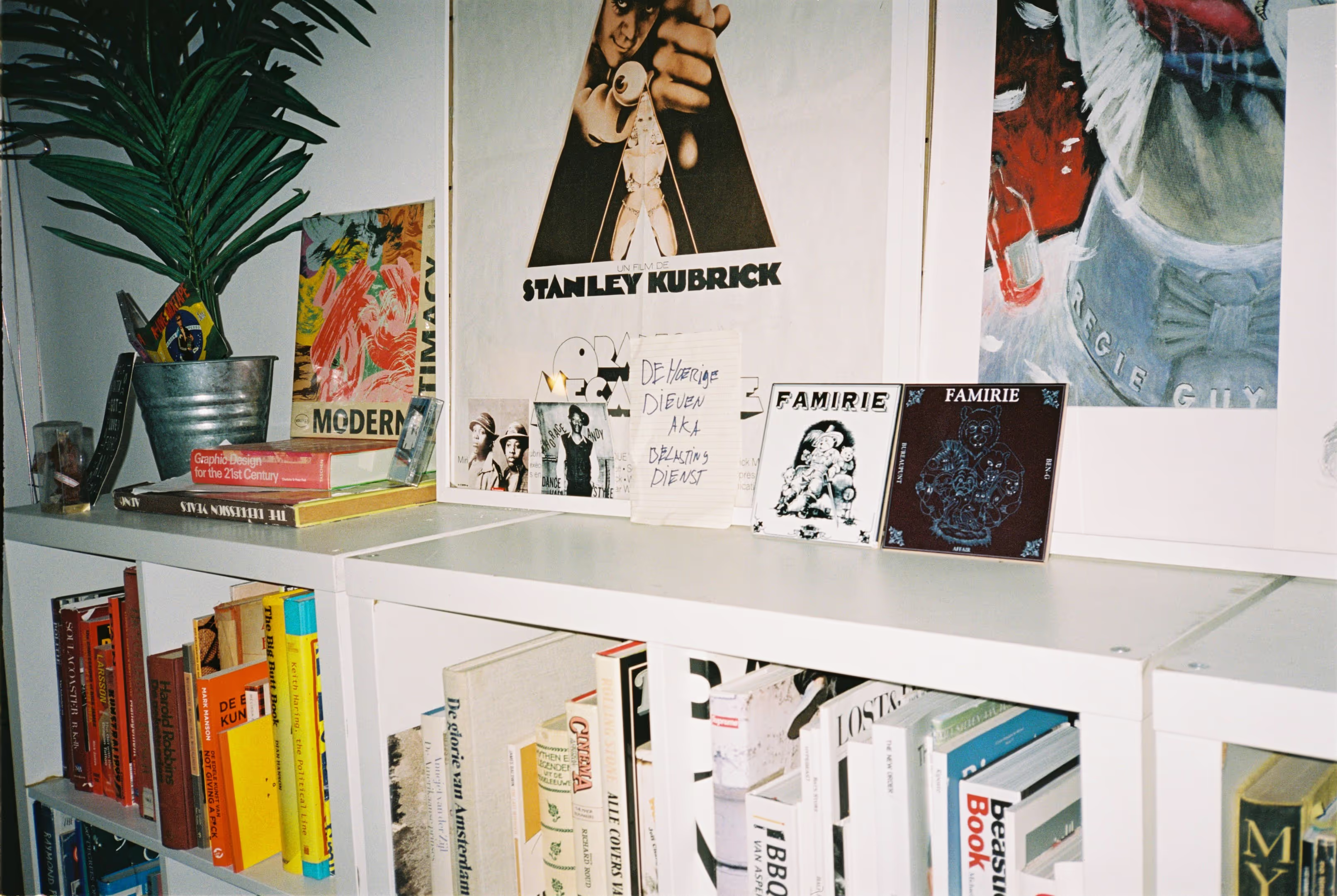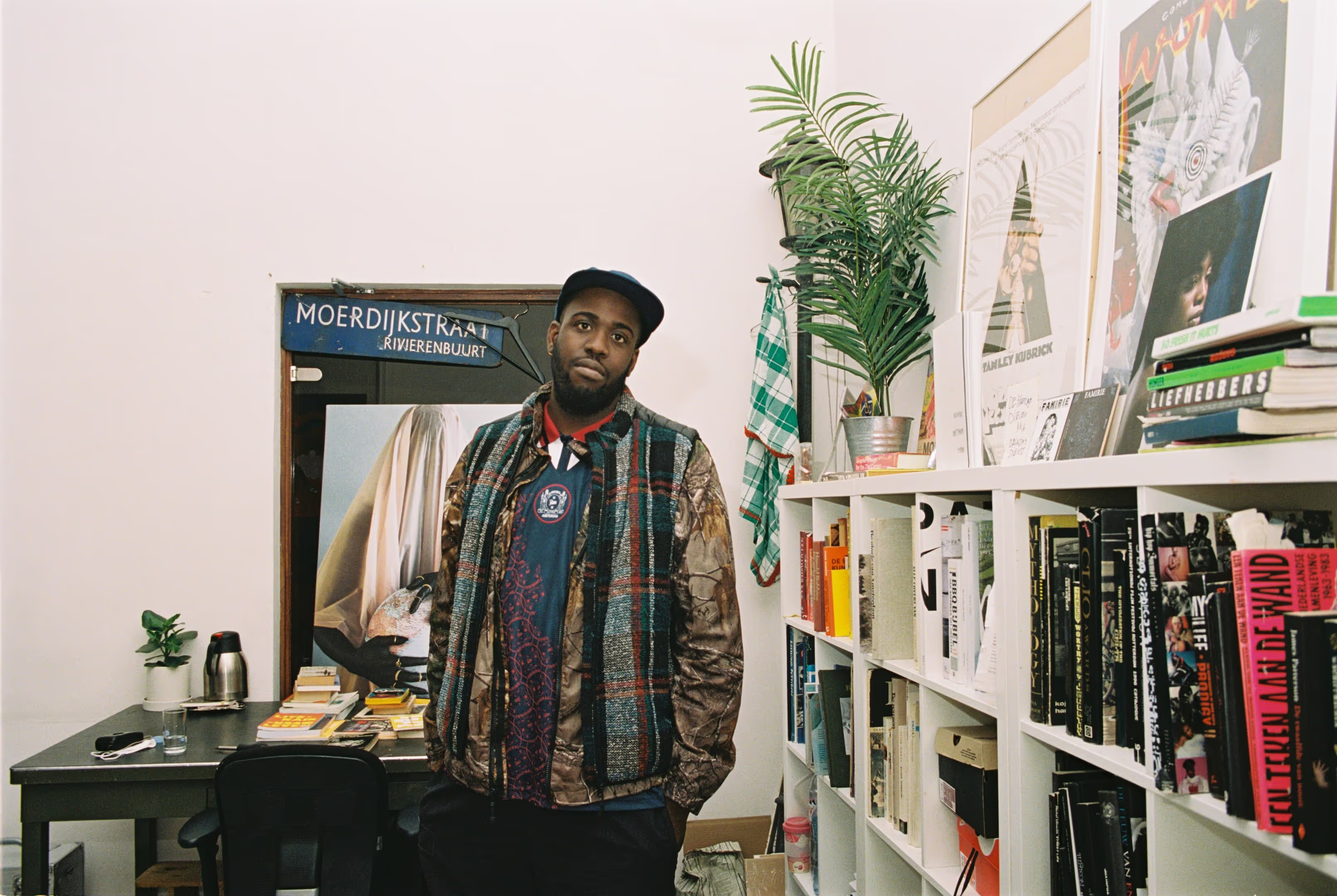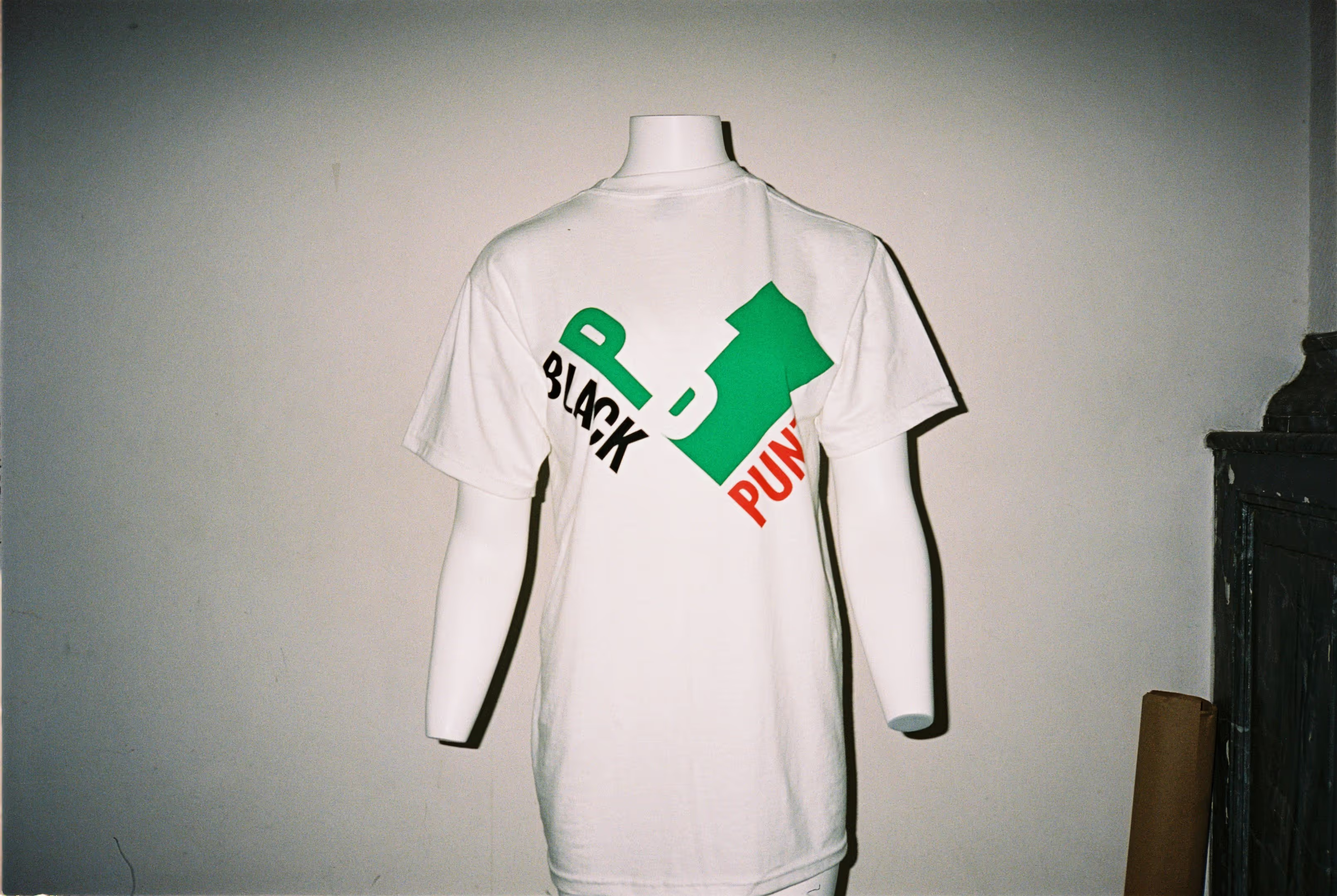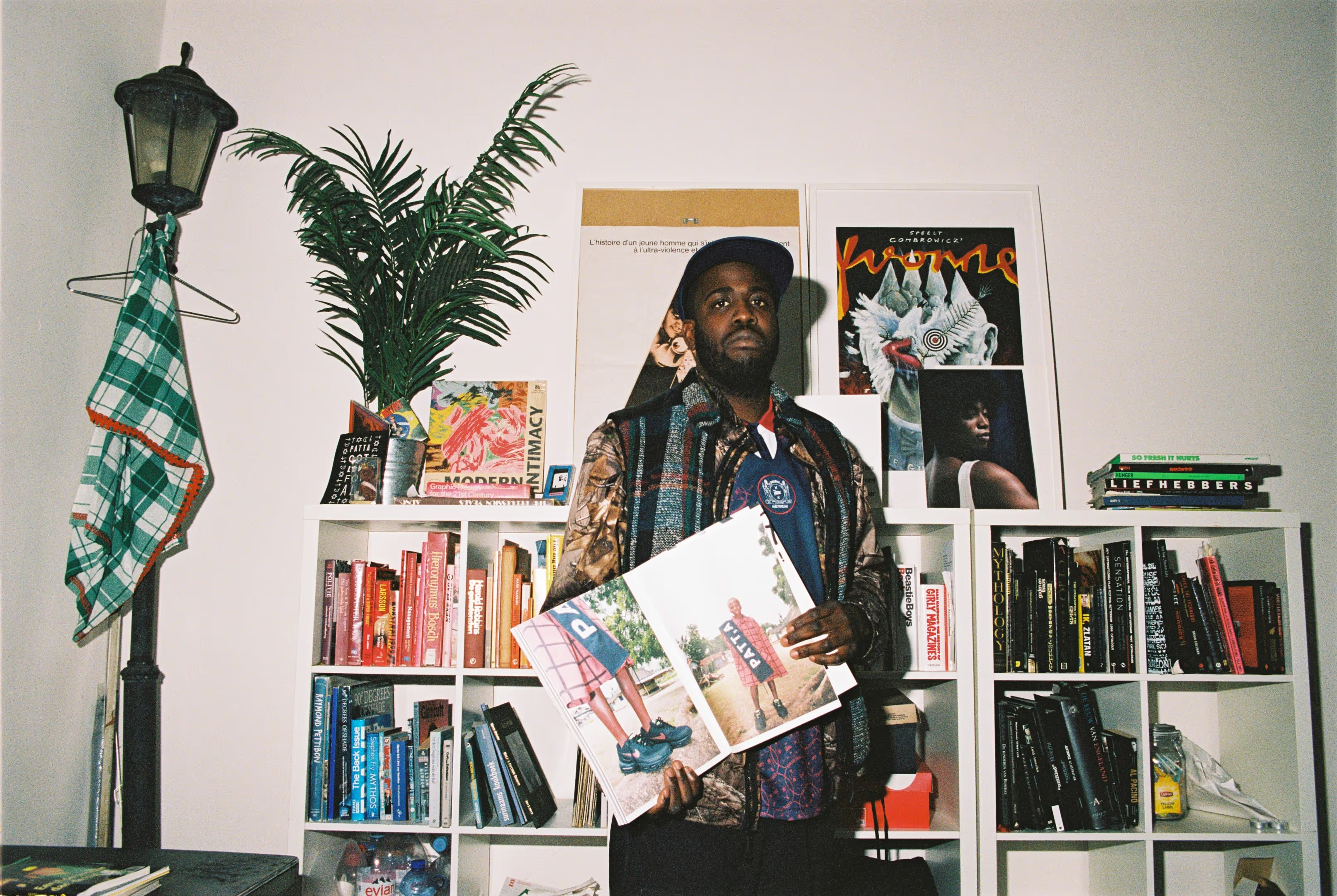





Words by Evelyn Simons
Photos by Lukas Turcksin
Keytrade and Horst share DIY entrepreneurship as a common denominator. With ‘Their Way’ they inspire their shared philosophy through a content series. ‘Their Way’ offers the stories of DIY entrepreneurs at the forefront of art, architecture and music. We delve into the messy, yet inspiring and insightful process of entrepreneurship. We celebrate and feature compelling stories, challenging initiatives and examples of integrity from around the world.
This month we’re speaking with Ghamte Schmidt, founder of Bureau Punt, an Amsterdam-based creative agency and platform facilitating DJ’s and artists with the freedom to share their vision and truth, while bridging the worlds of house, techno, and hiphop.
Horst: Can you tell us a bit about yourself? What is your personal trajectory and how did it arrive at Bureau Punt?
I’m originally from ‘s-Hertogenbosch (South-Netherlands), where I grew up until I moved out at about 17, when I got kicked out of school. My parents gave me the choice to find a job and contribute in-house, or to try out a different school. I moved to Amsterdam to study art, culture and entertainment. By that time, I knew the city already pretty well, because a lot of my Surinamese family is based out here. I dropped out of art school after two years though, as I noticed that I was already very much involved in all the stuff I was studying for. Alongside me MCing (which I had been doing since I was 15), I started contributing to the nightlife scene by helping out with organising parties, working behind the scenes, interning at State Magazine, writing features and gradually getting to know my way around the hiphop scene.
Fast-forward to Bureau Punt, which directly resulted from my frustration with not being able to MC at good events. I started to throw and host my own parties. Until then, people persistently put me in the hiphop-box, despite my varied taste in music. As the promoter of the party, I could venture out into different events and venues, and became heavily involved at Paradiso, for Appelsap and Live at the BBQ. Thanks to that position, others often came to me for connections, talent and names, and as I was introducing musicians to other organisations, it dawned upon me they weren’t getting what they were worth.
So I felt the need to step in, to create a buffer for these people, to protect them so they could uphold their creativity without making any concessions. It’s such a tricky business, rarely do people dare to say ‘no’, because they’re afraid they're sabotaging their own career. But you should be able to say ‘no’ if it doesn’t feel right. And you should become conscious of the parameters that define when something feels right or not, and be able to develop that intuition and to subsequently act on it. That’s really one of the main reasons we started.
Bureau Punt represents a wide array of artistic talent, this multifaceted and multidisciplinary scope stems from my own interests: film, music, photography, art, I love all of these things. The idea was to build something where people can collaborate in each other’s creative processes, while remaining true to their own artistic output.
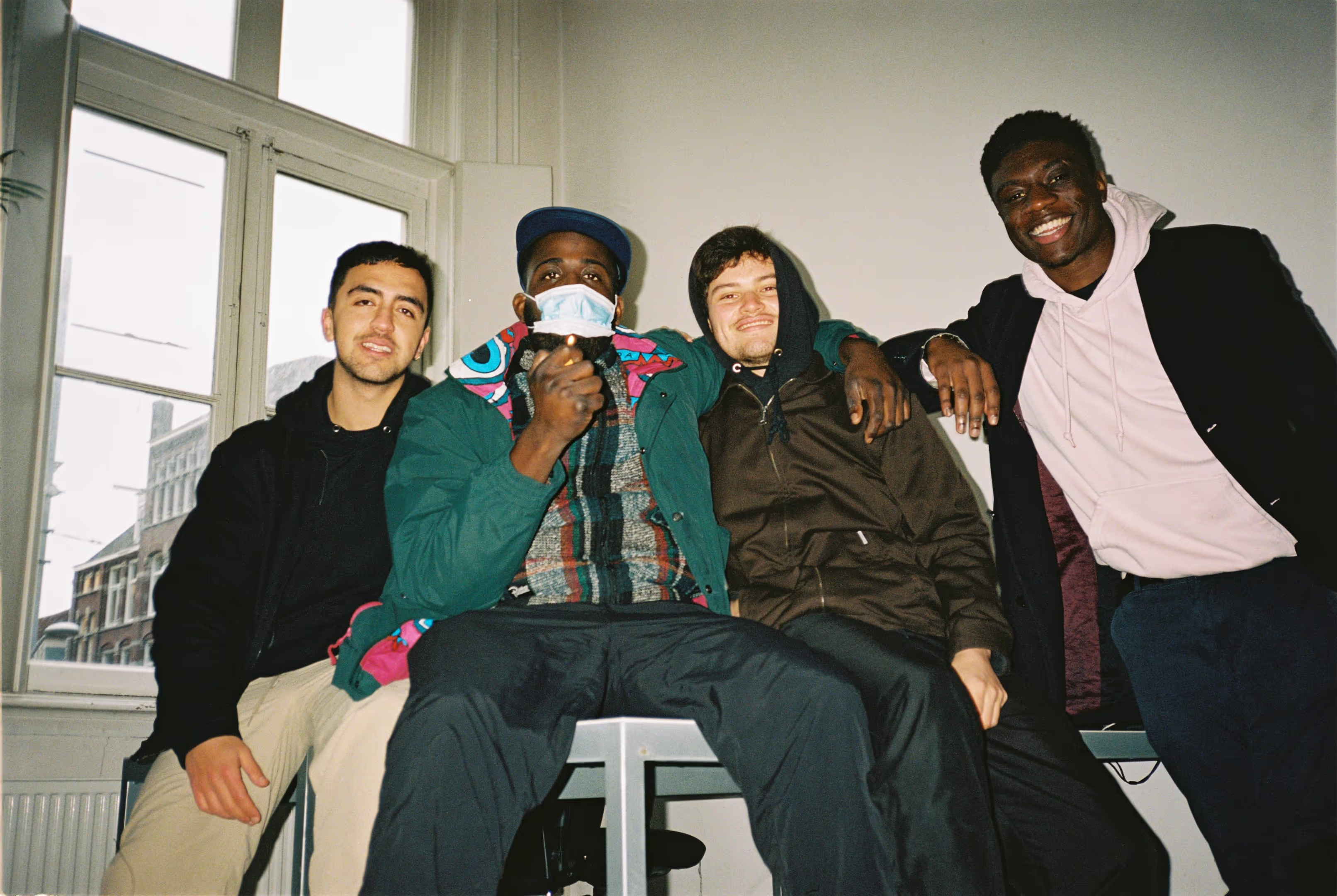
Horst: How did you go about formalising that? Was there a business plan, investors involved? How does one set up a creative agency?
It actually started with the mixtape Veldentaal which we were looking to release on a big label: me, Garrincha (a friend from school) and Larry Racer. Encouraged by people in the scene to do it ourselves, we went to register our company and launched Bureau Punt, without any kind of formalised business plan. The whole project grew over the years, out of necessity and shaped by experiences. I had zero clue of what management or bookings entailed, but became familiar with the intricacies over the years, and wouldn’t have done it differently looking back. Larry continued with the management and evolution of SMIB and Garrincha focused on producing. For me, Bureau Punt became a purpose, something I wanted to fight for.
Horst: The name is pretty peculiar, can you tell us a bit more about it?
When I was a teenager, I often was sent to the Police and Bureau Halt when I bumped into the law. It’s somewhat of a law-enforcement for juveniles who were involved with crime. Basically you get community tasks and have to do forced labour. The idea of putting a ‘halt’ to something stayed with me, but I replaced it with the word ‘point’, which is an ending, but also evokes a beginning and is an important punctuation mark taken for granted. Once noticed, you can’t overlook it anymore, something that echoes the artists that we represent: important punctuation marks that evoke new horizons and experiences. The logo’s [created by Necim Abiadh] colours refer to Pan-Africanism, Suriname and resistance: black, red and green. The graphics and forms are reminiscent of eighties activism pamphlets. I really dig that people can go about and decipher all the symbolism, and when they hear the reasoning behind their perspective changes. It’s something I want to further explore in the future.
"It’s such a hollow and shallow word, and has become nothing more than a marketing tool, like diversity. I deliberately stay away from it. I see myself more as a connector. The artists themselves are the so-called community builders."
Horst: What's the current outlook of the team? How many are you? And what's your specific role?
We exist for five years now, five years in which our work is not motivated by money, which does make this endeavour pretty challenging. Our decisions aren’t made with profit in mind, they are culture-based, so you have to work ten times as hard. Overall, everything we do is very DIY. We got a one-time financial support from our close circle to create a healthy feeding ground, but after that it's just figuring it out and hustling along the way to stay afloat.. So in reality, that comes down to working with volunteers and interns, people who have parallel jobs in or outside of the music industry to survive. This is, in all transparency, the current situation: we cannot remunerate our collaborators.
We’re currently nine people. The management is done by myself and the two juniors Tarik aka Chico and Joy a.k.a Dr.Dre (get well soon!). We have two creative directors for our visual content Robin Kamping a.k.a. Sjon de Baron and Susanne Janssen a.k.a. Suuspect. Stella aka Stells P is our booker, whereas Duncan Double Down is our PR and Communications guy, Sasu just joined as our very much needed producer and finally Nalin is in charge of finance. We always welcome additional people who want to get on board, especially P.o.C., though Black first and foremost. We want to create more awareness and bring people into decision-making positions, to not only have Black representation on the performative side of things.
Because we cannot pay, it’s hard to hold people accountable, so the question is: or you in, or are you fucking with our vision? What we’re building here is something for the long road, so our collaborators need to be up for it, have the time and energy in their lives to invest in the project, without an instant return on investment which we however are striving to create. If people commit though, then they really do commit, they become part of a bigger movement, and influence will come flowing back to them in one way or the other. Perseverance is the only way to go about in sculpting your passion onto a profession.
Horst: The word community inevitably comes to mind, though you seem to avoid that term?
It’s such a hollow and shallow word, and has become nothing more than a marketing tool, like diversity. I deliberately stay away from it. I see myself more as a connector. The artists themselves are the so-called community builders. At Bureau Punt, we tend to create a sustainable environment for them where they can express, create and, from those creations, generate influence and speak more directly to an audience, in turn solidifying a “community”. We are the people behind the people doing that, so of course we’re involved.
{{images-1}}
Electronic music audiences tend to be more tuned in with what’s going on behind the scenes, and question every actor in that ecosystem. In hiphop, the focus lies mostly on the performer, there is less focus on the infrastructure. So I think this all adds up to the imbalance in outrage.
Horst: You’re on the one hand closely linked to hiphop, on the other hand to the electronic music scene. How do you position yourself towards the conviction that people might have that you’re in between two very distinct worlds?
Well, it’s black music, so why wouldn’t I be able to move in between these spheres? To me, that’s the uniqueness of Bureau Punt, it’s about entailing a variety of modes of expression. It’s interesting though that the scenes are very differently organised: the way people communicate, the expectations, how money flows, the way of consuming..
Horst: The reckoning with anti-Black racism of some white actors in the music & nightlife scene generated a weighted debate. It has become increasingly apparent that no cultural institution can be separated from the conversation of systemic racism and the stifling of minority voices, least of all in music. The focus really lies on the electronic music scene, so what about hiphop?
Yeah, we definitely see the difference in reactions to this discussion. An inferno is waging throughout the electronic music scene, whilst nothing is happening in hiphop. I think it comes down to representation. The producers and performers of hiphop, but respectively also its consumers, are predominantly Black - even in these Western-European white countries. In house and techno however, even though also originating from Black culture, that representation is much more absent, making the systemic racism more apparent.
Don’t get me wrong, the infrastructure is similar (meaning mostly white), though in hiphop, at least there are some Black-owned independent organisations such as SMIB, Quatro Vision, CMC Records, Event Us; Rotterdam Airlines, amongst others. Alongside Black makers and creators, these people are role-models, representatives - making the movement more outspokenly and undisputedly Black. As for white hiphop organisations, they’re more aware of the fact that they’re white and are taking up space in a culture and in a music scene that is rooted in dealing with the oppression of Black and Brown people. They strategically use and amplify certain voices.
With house and techno, it’s a whole different conundrum where white people took and appropriated that culture without crediting, transported it from the US to Europe, resulting in an indifference to its roots and a loss of knowledge of what it’s all about.
In addition, to be fair, electronic music audiences tend to be more tuned in with what’s going on behind the scenes, and question every actor in that ecosystem. In hiphop, the focus lies mostly on the performer, there is less focus on the infrastructure. So I think this all adds up to the imbalance in outrage.

Horst: Do you see ways to reshuffle power structures within the nightlife industry to positively affect Black communities? Or does it have to be rebuilt from the ground up?
I truly believe and stand behind activism, but I’m very much annoyed with the temporary and momentaneous performance of what went down this year. I do hope we can shift the standard, which is now white, and talk about integration in the long-run: it’s time for white people to integrate into Black spaces and into Black music. I mean, I’m Black everyday, I don’t have the choice to step in and out of it. When I walk in the streets, people don’t know I have Bureau Punt, or that I’m affiliated with Paradiso, so they treat me like a Black man. And that means they treat me in an unjust way.
At Bureau Punt it’s crucial that we raise awareness, we have been vocal about this since the beginning, it’s not something that surfaced only this year. What did change, is that the pandemic has stranded the entire industry, nobody’s making money. I thought of taking on a parallel job myself, just to be able to pay my rent, but I realised that now is the moment to stay 100% invested. The responsibility has gotten so much bigger, it’s not about me being able to support myself. We need to push this battle, because we’re the only Black-owned booking agency in Belgium and the Netherlands that moves between those two spaces. We cannot get discouraged now.
With regards to the existing structures: of course they are too much embedded in the white standard, making them problematic. If you want Black and P.o.C. voices to be integrated in your operations, just hire and pay us. For me, it comes down to ‘why’. Why do you want to do better? Are you engaged in anti-racism out of survival, because it’s not possible to not be invested in the discussion nowadays? Or do you really care about these Black voices and the Black bodies that you have capitalised off for the past few years, and finally want to give back?
Racism is a very fickle thing, it goes into a lot of things, both on micro- and on macro-levels. To confront yourself with all of those things as a white organisation, is a long and uncomfortable process. Parallel to the learning and holding yourself accountable, it’s about speaking up.
{{slider-1}}
"Do it because the ones coming to your events and into your spaces, are human beings that are frowned upon living in a racist, capitalistic, imperialistic system. That’s years and years of oppression. If you really want to give them the space to be themselves, and to elaborate themselves, it’s about engaging in this process wholeheartedly."
Horst: Music, and especially hiphop, seem to have been an important starting point for what you're doing today. It makes you hard to put in a box as well: MC, manager, radio producer, event organiser, … How do you balance these talents?
I come from a household where music was omnipresent, spanning various styles. Music is a valid part of communication, and an important tool to express yourself and communicate feelings, especially in Black culture.
I tried my hand at piano and guitar, but the thing I truly really mastered along the way is MC’ing. I feel I still have a lot to learn when it comes to all of the responsibilities my job entails. Event-organising, radio producing, all of that. Often I just did something because it needed to be done, out of necessity to do it on our own terms.
Horst: What about finding, selecting, and building relationships with your artists?
I’m a digger: mixes, radio stations, parties etc. I’m always on the lookout. Also, people come and present themselves or other people to me. It’s really a mix. What we are consistent about, is that we check with everyone on the team and on the artist roster before we take on someone new. It has to complement, fit into the whole thing. We organise our lives along the multifaceted output of creativity of Bureau Punt, so everyone needs to be invested in being uncompromising. Aesthetics can be eclectic, but our artists really need to be dedicated to occupying their own space and dealing with the liberation of Black people in their work. If one of the artists wants to play at a festival where the organisation is racist, we cannot commit, and then it’s time to say goodbye, also to stay in tune with our other artists.
Horst: How are you experiencing the current period? And how do you see the future if there's not much revenue?
I feel we will move towards a scene that is more underground, and locally orientated. The idea of the party as mere shallow entertainment will of course not cease to exist, but that’s not where the focus will be. There is a growing appreciation for what nightlife entails. Even if governmental support remains absent for now, the audience’s consciousness is being heightened. It’s about adding on a joy for life, and people making that possible will be valued. It’ll be much more community-based (there we have that word again).
In reality, it’s an enlargement of the challenges we’re already facing: being an underground organisation that places ethics first, moving in commercial scenes. You have to adapt to absurd mechanisms of ticket sales, high DJ fees, etc. It’s a hustle, and following the course of integrity throughout that hustle isn’t an easy path - it’s lined with obstacles and conflicts between money and morale. You have to be able to look at yourself in the mirror and be honest with yourself: are you challenging the status quo? To have peace of mind is the richest, the most wealthy you can get: to sleep at night knowing you’re in line with your values, even if your pockets and your stomach is empty, they will fill up along the way.

"Also: take care of your mental health. It’s going to be a bumpy ride with a lot of self-doubt, imaginary demons asking you whether you’re doing the right thing, actual people shouting their opinions in your ear. Take care of that and stay close to yourself, by surrounding yourself with people you feel good with. Make love your main motivation, not money!"
Horst: Do you have any advice for DIY entrepreneurs aspiring a creative job in music or nightlife?
Get some money in your pocket before you start. It doesn’t have to be a huge budget, but if you already have a dream now - whether you’re 17 or 42 - and are currently earning money, put some aside, just to have a buffer, just so you can make choices independently. It’s important to stand 100% behind what you do, so that nobody can change your narrative, or take a hold of your dream.
Horst: As you have a heart for music, it's your passion. I can imagine your private and professional life are very much infused with each other. How do you deal with that?
This is a tough one. As a Black person or a Person of Colour engaging in a professional activity in a white country, there are so many daily challenges to combat: talking with toxic organisers, institutions, justifying oneself, fighting for your worth etc. My parents had warned me I would have to work twice as hard, I wasn’t prepared that that was merely to stay calm and not explode on the workfloor out of frustration of constantly being confronted with racism. To a certain extent, I’m “free” to engage with whomever I want, but trying to make it in this business and fighting for your peers, you sometimes have to engage with these discriminatory systems, which is often triggering. Coming home and ventilating about that, again is triggering. In order to stay afloat, I shift out a lot of negativity where I can, like in my personal space who and whom I converse, connect and bond with. Literally just to make it bearable to interact with the world. So it’s necessary to surround yourself, both professionally and privately, with people who are on the same wavelength and who understand that struggle.
Horst: A last one: what makes or made you proud?
This is the hardest question. First of, let me say that I find the word proud a bit cringy and weird and it doesn’t nearly describe what I feel if I see one of our artists striving or performing, doing what they love the most. I’m proud of the fact that so many talented people want(ed) to work and put their fate in our hands, and feel or felt like we supported them to do what they love. But there are much more steps to take and pitfalls to crawl out from as we’re not there yet. We still have bills, debt, obstacles etc. But what I do stand behind is our perseverance, the integrity we move by, which we manage to stay true to for five years and counting! And I think there is a bright future ahead when our approach and control over our financial flow stabilizes.
